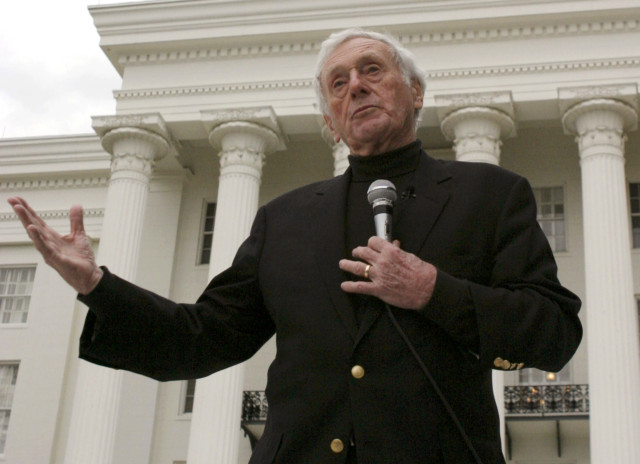
Washington: The combination of Al Jazeera and America doesn’t exactly sound like a match made in Heaven, or Jannah for that matter.
But that’s not stopping the deep-pocketed media giant, funded by the government of Qatar, from spending hundreds of millions of dollars to once again try to build a presence in the United States.
On Tuesday, Al Jazeera launches Al Jazeera America, an ambitious news network that hopes to challenge CNN, Fox News and MSNBC on their own turf. It has opened 12 bureaus around the country and is hiring almost 1,000 people, including several big-name journalists, with promises of covering serious national news here and a goal of becoming part of the American landscape.
Persuading pay-TV distributors to carry Al Jazeera America and getting people to watch it may be another story. There is still bitterness toward Al Jazeera for providing an outlet for Osama Bin Laden after the 9/11 attacks, a move which led some to derisively label the network “Jihad TV.”
“For many Americans, the perception is these are the folks who brought you Osama Bin Laden,” said Allen Adamson, a managing partner of marketing firm Landor Associates. “Even though they were providing a news function, there was a case of don’t confuse me with the facts.”
Since then, Al Jazeera has won much praise here for its in-depth coverage of the Middle East and is considered a valuable source of information on the region.
“Al Jazeera can cover the Arab world better than any US network by far,” said Chris Harper, a professor at Temple University’s School of Media and Communication and a former foreign correspondent for ABC News.
That doesn’t mean Harper and others still don’t see a slant to its coverage.
“Al Jazeera has its point of view and that includes a pro-Palestinian bias and to a certain extent an anti-American bias,” Harper said, adding that this does not bother him because, “I rather like that I don’t have to figure out where they stand.”
Rather than focus on the Middle East, which is its wheelhouse, Al Jazeera America made the decision to provide in-depth coverage of America that it says other news channels have abandoned. It has opened bureaus not only in media hot spots New York, Washington and Los Angeles, but also Detroit, New Orleans and Nashville. Headquarters will be in New York City with studios near Penn Station, although its flagship show “America Tonight,” anchored by Chen, will be done out of Washington, D.C., where Al Jazeera America has leased space at the Newseum, a museum devoted to journalism.
Harper questioned that strategy.
“Al Jazeera is a go-to place when things happen in the Middle East,” he said. “I’m not sure Al Jazeera America will be a go-to place to find things out about the United States.”
Even some former Al Jazeera staffers are doubtful about emphasizing America in its coverage. Tony Burman, a former head of Al Jazeera English and currently a professor at Ryerson University, said in a recent Toronto Star opinion piece that such an approach has “the odour of disaster.”
Ehab Al Shihabi, a senior Al Jazeera executive and acting chief executive of Al Jazeera America, defended the American-centric focus in a recent interview, saying the channel would “elevate the mainstream voice” while steering clear of the tabloid stories, murder trials and partisan bickering that have become synonymous with cable news.
“A lot of the audience wants in-depth journalism,” he said, adding that because its owner isn’t concerned primarily with profits and losses, Al Jazeera America won’t feel pressure to go after sensationalistic stories in the hopes of driving ratings. The channel will even carry 50 per cent fewer commercials than other news channels.
That’s music to the ears of the journalists Al Jazeera America has recruited.
“Our mandate is to look at untold stories and look deeper and in a more thoughtful way,” said Chen, who will anchor “America Tonight,” Al Jazeera America’s flagship evening news magazine, which will feature stories as long as 12 minutes. “It’s reporting that a lot of networks would like to do.”
Former Al Jazeera English and ABC “Nightline” reporter Dave Marash thinks CNN and the other channels have dropped the ball on hard news, which could leave an opening for Al Jazeera America to woo some viewers, although it won’t be easy.
“What they’ve got going for them is that for their kind of news, which I would call real news, there is virtually no competition,” he said.
Many of Al Jazeera’s new staffers were victims of belt tightening by their former employers, who have reduced staff by closing bureaus here and abroad and getting rid of veteran talent and their large paychecks in favour of less-experienced and cheaper reporters.
Seigenthaler, 57, was forced out at NBC in 2007 and ended up going to work at his family’s public relations firm. Chen was working as a marketing consultant. Renowned investigative reporter Edward Pound had become a spokesman for the Recovery Accountability and Transparency Board, a government watchdog.
“The people who got cut were the most experienced,” Seigenthaler said. “It’s been a sad commentary on journalism in the last five or six years.”
None of Al Jazeera America’s staff seems concerned about working for a news organisation controlled by a foreign government. “Coverage is not coming from a directive from Doha, it is coming from incredibly talented American journalists they’ve hired at top levels,” said Jennifer London, who left public television KCET-TV Channel 28 here to become Al Jazeera America’s Los Angeles correspondent.
Marash, who left Al Jazeera English in 2008 after clashes with management, hopes London is right. “Upper management at Al Jazeera English was not excellent and had little knowledge of and some animus toward the United States,” he said.
Although few industry observers expect Al Jazeera America to make a dent against the incumbent networks any time soon, especially with only half the reach, Al Shihabi has his eyes on the prize.
“We’re here to win,” he said, “not survive.”
latimes












